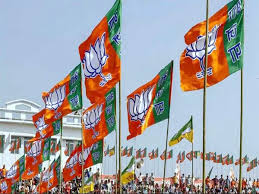BJP is focusing on consolidating non-tribal votes to regain power, recognising its challenges in tribal regions.
New Delhi: Following the Election Commission of India’s announcement of the election dates, the Jharkhand unit of the Bharatiya Janata Party (BJP) has kicked off its campaign and preparations for the upcoming Assembly elections. The elections are set to be held in two phases, on November 13 and 20, with the results to be announced on November 23, coinciding with the outcome of the Maharashtra elections.
Since the announcement of the upcoming election, BJP has shifted its focus toward consolidating non-tribal votes, recognising that the party faces challenges in securing strong support from tribal regions. Acknowledging that their presence in tribal areas is relatively weak, BJP is intensifying its efforts to strengthen its hold in constituencies which are dominated by non-tribal populations. By consolidating its voter base in these areas, the party aims to secure a substantial majority of the vote share from non-tribal seats. This strategy is seen as crucial for BJP to offset any potential losses in tribal regions and maintain an overall electoral advantage. To achieve this, the party is likely to focus on issues that resonate with non-tribal communities, enhance grassroots campaigning, and leverage its existing influence in these areas to maximise voter turnout and support.
Out of the 81 Assembly seats in Jharkhand, 53 are non-tribal constituencies, where the majority of the population is non-tribal. In the previous election, BJP managed to win 23 of these non-tribal seats. However, Congress made significant inroads into BJP’s stronghold, capturing 10 of these seats. This dent in BJP’s base was a crucial factor in their loss, allowing the opposition alliance, led by the Jharkhand Mukti Morcha (JMM) and Congress, to form the government.
Recognising this, BJP is now focusing its efforts on consolidating non-tribal votes to prevent the Congress and other opposition parties from gaining further ground in these key constituencies. BJP understands that the path to regaining power lies in securing a solid majority in these non-tribal seats, where it has historically been stronger, rather than focusing primarily on tribal areas where it has faced challenges. By shoring up its non-tribal vote base, BJP aims to prevent a repeat of the previous election’s losses, making sure that opposition parties cannot further chip away at its vote share in these decisive seats. This strategy reflects BJP’s keen awareness that consolidating non-tribal support is essential to securing a majority and reclaiming power in Jharkhand.
Non-tribal voters in Jharkhand have grown frustrated with political parties, as the election discourse has largely centred around tribal issues. While Jharkhand was originally created to serve as a homeland for tribal communities, tribal voters do not form the majority in the state. According to a political analyst, a significant portion of the electorate consists of people from eastern Uttar Pradesh and the former undivided Bihar, from which Jharkhand was separated in 2000. These voters tend to support non-tribal candidates and parties, which creates a favourable environment for BJP. As a result, BJP performed strongly in the non-tribal constituencies during the 2019 election, particularly in urban areas.

